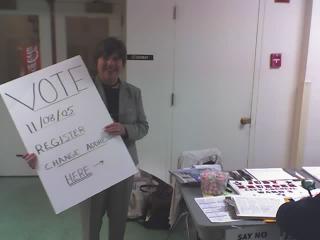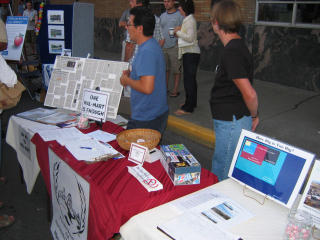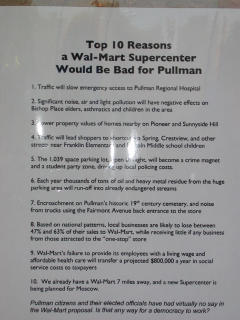It is indisuptable that the renaissance in growth and development that Pullman has experienced in the last ten years is attributable in large part to Schweitzer Engineering Labs, Pullman's largest private employer and one of the most successful and fastest growing companies in America.
It is equally indisputable that policies implemented by the Gregoire administration, such as the reinstituting of the death tax and the new Department of Ecology stormwater regulations have hit Schweitzer hard, as well as the plethora of business-unfriendly regulations left in place by previous Democratic administrations such as the B&O tax, stringent unemployment and health insurance requirments, et. al.
The 2008 gubernatorial election for Pullman is not about how Gregoire has botched transportation problems on the west side of the state, or even so much the unaccounted for sex offenders, problems with the WASL or the
$2.5 billion spending deficit Gregoire has run up, although those are important issues to be sure. No, our real issue is whether SEL continues to grow in Pullman and therefore whether the city of Pullman continues to grow and whether we continue to improve our quality of life, our schools, our parks, our streets, etc.
WSU will not be our savior. President Elson Floyd has already announced a hiring freeze and a
20% cutback in courses offered. And branch campuses in Vancouver, Tri-Cities and Spokane continue to grow at the Pullman campus' expense.
We tried to get rid of the death tax through I-920 (SEL is a privately held, employee-owned company; the death tax could be ruinous) but the
teachers union and other left-wing groups spent millions on lies and fear tactics designed to shoot the measure down. We tried to stop Ecology from implementing the costly stormwater regulations, but
they wouldn't listen.
The choice is clear. After 20 plus years of business-unfriendly policies in Olympia, it's time for change. It's time for Dino Rossi.
From today's
Moscow-Pullman Daily News:
Schweitzer Engineering Labs hitting hiring goals; Company officials say rising costs may push future growth out of state
Schweitzer Engineering Laboratories is on track to meet its new hiring goals for 2008, but company officials say they're still trying to determine how much of the company's future expansion will happen in Pullman.
SEL Director of Public Affairs Susan Fagan said 249 people have been hired so far to fill positions ranging from engineers, manufacturers, pilots and administrators.
"Typically, we add new positions every week. I can give you a number (of open positions) now, but it will change by next week," she said, adding that many of the new employees are found locally. "We hire the most qualified people we can find, and we find a lot of those people right here."
She said "a majority" of this year's new hires now work in the Pullman headquarters, with others located at plants and offices throughout the world.
In February, the company reported that more than 300 new jobs would be available in 2008, most of which would be needed in Pullman. The news followed a fall announcement that a 100,000-square-foot manufacturing facility was to be constructed in San Luis Potiso, Mexico, primarily to make and assemble electronic relay panels and control houses. The expansion in Mexico also was expected to fuel growth on the Pullman SEL campus, as the high-tech components for the panels are designed, created and tested by workers in the company's Pullman headquarters.
Fagan said the company has grown continuously since its first product was sold in 1984, and SEL President Ed Schweitzer has indicated that employee numbers will double in the next five years.
But growth won't be confined to Pullman, as the cost of business is high in the state of Washington, especially in the areas of health care, unemployment insurance and business and occupation tax.
"The growth is going to happen here, but to what extent, we don't know," Fagan said, adding that the company has sent out other letters of interest to about 10 other states - including Idaho - inquiring as to whether they would support SEL growth through manufacturing plants or offices.
With roots in manufacturing parts used in generating electric power, the company has created products used in oil refineries, wind farms and high-voltage substations. Its products include clocks that are accurate to the microsecond, encryption equipment used to protect secure equipment and systems for the U.S. Navy that allow ships to run on electrical power rather than steam power.
SEL employs nearly 2,000 employees at more than 60 locations worldwide, and its products are used in 119 countries across the globe.
SEL Director of Corporate Marketing Mark Zeller said the company's Pullman presence will continue to grow. As demand for the company's products increase, the necessity to produce more parts will result in more new positions.
"There's no sense sending something out to China to be made if we can make it here," he said. "There's company growth all over the world, and we'll continue to pursue that, but Pullman is home."
Fagan said SEL is proud to be a Pullman-grown business, but Washington state mandates and requirements are providing hurdles. The company spends millions of dollars annually to provide health insurance to the company's more than 1,000 Pullman employees.
Fagan said the state of Washington mandates companies include a lengthy list of benefits within the insurance policies companies provide employees. That continually bumps up the cost of coverage even if those benefits are not needed by employees.
Fagan said unemployment insurance is also on the rise and the state's "death tax," reinstated by Gov. Chris Gregoire, is daunting. The impending citywide stormwater utility, which could cost SEL $20,000 a year for its roughly 800,000 square feet of impervious surface on its campus located off Terre View Drive, also is a point of contention.
"It's starting to look kind of burdensome, isn't it?" Fagan said. "We're looking at what the best move is for the company to grow. We're growing with great thought."
Pullman Mayor Glenn Johnson said he does his best to stand up for local business to state leaders in Olympia. Johnson, who is secretary of the Association of Washington Cities - and slated to move up to the role of vice president later today - said he's vocal to Legislators about mandates such as municipal stormwater permits and taxes that "are burdens the state imposes that makes it difficult to recruit" and retain businesses. He added that the mandates are especially troubling to Pullman as a border community, since to save money, businesses could just locate in Idaho.
"We're trying to make that point very clear to our Legislators," he said. "I guarantee that they're all concerns. We hear them and we bring them to our Legislators."





















